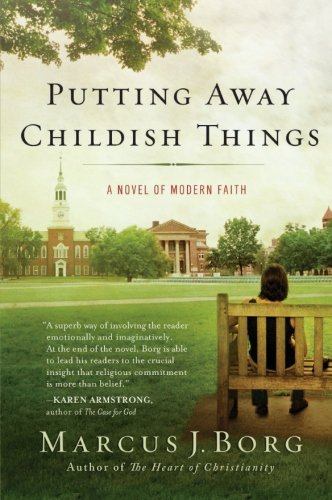Book review: Putting Away Childish Things
by Marcus Borg
★★★★★
This is a story about believing, and Borg’s first-ever novel may be among his best books. The main character, Bible scholar and professor Kate Riley, is a progressive Christian with a devotion as strong as any fundamentalist believer.
For a glimpse of how Kate lives as a Christian, we might peek into one of her lectures. In a discussion of whether the story of Adam and Eve is “true,” Kate teaches, “The identification of truth with factuality is a cultural product of the Enlightenment. The success of the scientific method led many people to think of truth as what can be verified, and what can be verified came to be identified with facts. Within this framework, if something isn’t factual, then it’s not true.” Kate explains her point a bit later, with a quote from Thomas Mann: “A myth is a story about the way things never were, but always are.” She tells her students, “A myth is not about something that happened, that’s not its point. But it’s about the way things always are. And [Mann’s] definition also provides a way of distinguishing true myths from false myths—a false myth is a story that’s not about the way things are.”
Perhaps writing fiction allowed Borg to dig down inside himself to personal levels that were not possible in his nonfiction works. He lays bare what life and Christian practice is like for a liberal Christian. As I said earlier, this book is about believing, a word that more traditional Christians have a hard time associating with progressive Christians. How can one have faith in God while at the same time denying a literal interpretation of the Bible? How can such a Christian claim to believe? Is a progressive (liberal) Christian a real Christian or a mockery of true Christianity?
Here is what makes this book fascinating to me: The story will prove disappointingly bereft of a climax for anyone who doesn’t appreciate the tension of literal-versus-liberal Christianity. But for anyone trying to understand the progressive viewpoint, the climax is beautifully sculpted. Kate’s transition by book’s end into a “believer” is a perfect ending.












 354 Circles
354 Circles
 603 Goodreads Friends & Fans
603 Goodreads Friends & Fans

 Hello! I'm an author, historical Jesus scholar, book reviewer, and liberal Christian, which means I appreciate and attempt to exercise the humanitarian teachings of Jesus without getting hung up on any particular supernatural or religious beliefs.
The Bible is a magnificent book that has inspired and spiritually fed generations for thousands of years, and each new century seems to bring a deeper understanding of life’s purpose. This is true of not only Christianity; through the years, our age-old religions are slowly transforming from superstitious rituals into humanitarian philosophies. In short, we are growing up, and I am thrilled to be riding the wave.
I avidly read all thought-provoking religion titles. New authors: I'd love to read and review your book!
Hello! I'm an author, historical Jesus scholar, book reviewer, and liberal Christian, which means I appreciate and attempt to exercise the humanitarian teachings of Jesus without getting hung up on any particular supernatural or religious beliefs.
The Bible is a magnificent book that has inspired and spiritually fed generations for thousands of years, and each new century seems to bring a deeper understanding of life’s purpose. This is true of not only Christianity; through the years, our age-old religions are slowly transforming from superstitious rituals into humanitarian philosophies. In short, we are growing up, and I am thrilled to be riding the wave.
I avidly read all thought-provoking religion titles. New authors: I'd love to read and review your book!
 Hi! While Lee writes the articles and reviews the books, I edit, organize, and maintain the blog. The views expressed here are Lee's but I'm his biggest supporter! :-)
Hi! While Lee writes the articles and reviews the books, I edit, organize, and maintain the blog. The views expressed here are Lee's but I'm his biggest supporter! :-)
In would hate to think the myth of Adam and Eve is the story of the way things always are. Isn’t a myth a story that people tell themselves to try to explain something they don’t understand? In other words, there guess is as good as mine?
An example of how a myth is “always true”: In the Adam and Eve story, they ate of the tree of knowledge, and lost their place in paradise. Happens all the time. Ignorance is bliss.